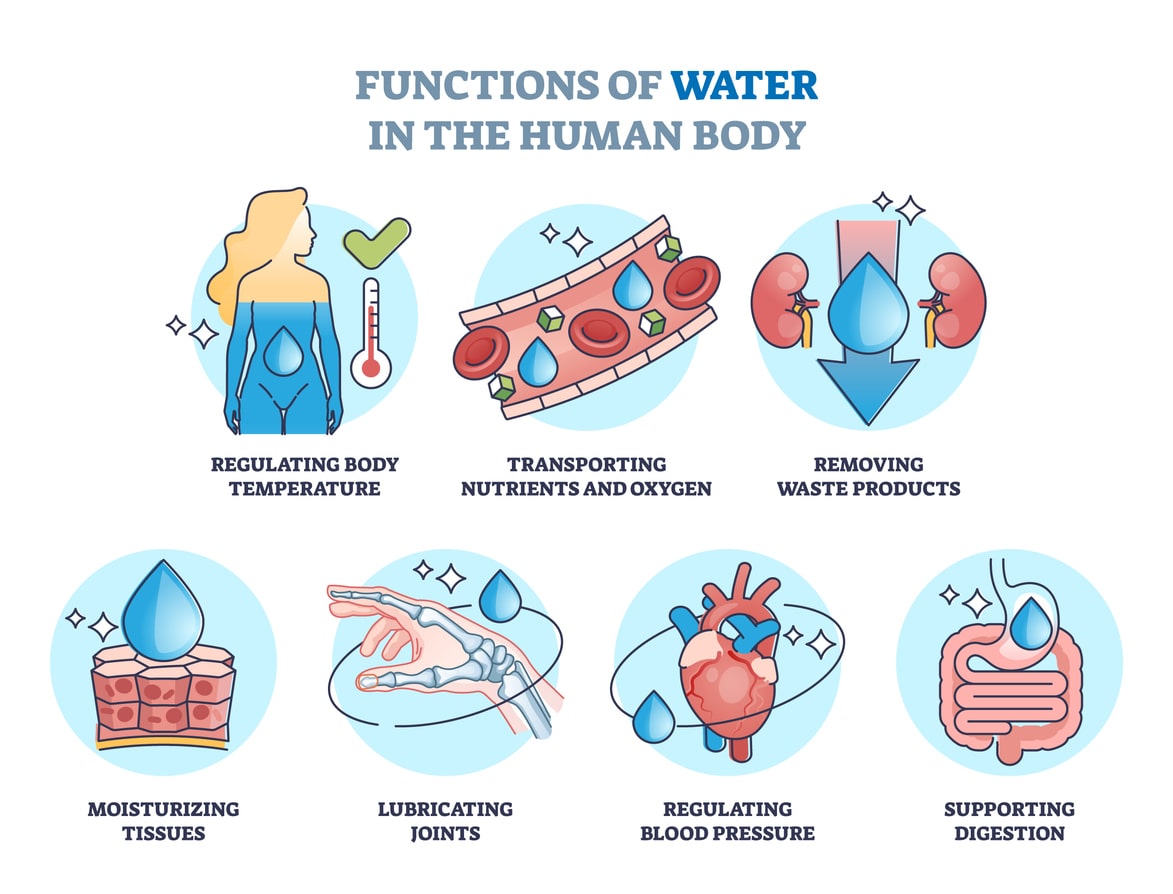
Are You Drinking Enough Water? The Impact of Hydration on Digestion
Hydration plays a crucial role in maintaining good health, and one of the areas most affected by our water intake is digestion. The human digestive system is a complex process that relies heavily on adequate fluid levels to function efficiently. Hydration aids in breaking down food, absorbing nutrients, and eliminating waste. This process is essential for keeping your digestive system running smoothly.
How Hydration Affects Digestion
Water is essential for the smooth functioning of every part of the digestive process. Here’s how water supports digestion:
- Breaking Down Food: Proper hydration aids in the production of saliva, which is critical for the breakdown of food in your mouth. Saliva contains enzymes that begin the digestive process before food even reaches the stomach. These enzymes help break down carbohydrates, making it easier for the stomach to process.
- Absorption of Nutrients: Once food reaches the stomach and intestines, water helps dissolve soluble fiber, which helps in absorbing important nutrients. It also assists in transporting nutrients through the bloodstream to various body parts.
- Preventing Constipation: Water softens stool, which helps prevent constipation. When you don’t drink enough water, the colon pulls more water from the stool, making it dry and difficult to pass. Drinking enough fluids ensures your digestive tract works efficiently, promoting regular bowel movements.
- Maintaining Gut Health: The human gut hosts trillions of bacteria. Proper hydration is key to a healthy balance of these microorganisms. Water helps move food through the intestines, preventing digestive issues like bloating and indigestion.
- Regulating Digestive Enzymes: Hydration helps produce digestive enzymes in the stomach and small intestine. These enzymes break down proteins, fats, and carbohydrates, helping your body better absorb nutrients. Without enough water, enzyme production slows. This can cause digestive discomfort and prevent nutrient absorption.

Link Between Hydration and Gut Microbiota
Hydration is key for a healthy gut microbiota. This is the community of microbes in your digestive tract. Water helps move food and waste through the intestines and creates a good environment for beneficial bacteria to thrive. It also aids nutrient absorption, allowing the gut to use nutrients more effectively. Dehydration can slow digestion and encourage the growth of harmful bacteria. This can cause digestive issues like bloating and constipation. Drinking enough water keeps your gut microbiome healthy. It also helps with digestion and nutrient absorption.
Signs You Might Not Be Drinking Enough Water
It’s easy to overlook hydration’s role in digestion when you’re busy. However, dehydration can have noticeable impacts on digestion. Some common signs that you might not be drinking enough water include:
- Constipation: As mentioned, water helps soften stool and promotes regular bowel movements. When dehydrated, the body absorbs more water from the stool, leading to constipation.
- Dry Mouth and Throat: Saliva is vital for digestion, so if you’re not drinking enough water, your mouth may feel dry. This can make it harder to chew and swallow food and can lead to discomfort during meals.
- Bloating and Gas: Dehydration can slow digestion, leading to bloating and excessive gas. If your digestive system is slow, food may stay in your stomach and intestines too long. This can cause discomfort.
- Acid Reflux or Heartburn: Not enough water can upset digestion, causing acid reflux or heartburn. Water helps dilute stomach acid and flushes it from the esophagus, preventing these conditions.
- Fatigue and Low Energy: Dehydration can also lead to fatigue and overall lower energy levels. A sluggish digestive system may leave you feeling tired and low on energy.

How Water Prevents Digestive Issues
Staying hydrated is essential for preventing and managing common digestive issues. To stay properly hydrated, aim to drink at least eight 8-ounce glasses of water daily, especially when consuming more fiber. Hydration also helps prevent indigestion by aiding in food breakdown and nutrient absorption. Drinking a glass of water before meals can help prepare the stomach, while sipping water throughout the day supports digestion.
Additionally, dehydration can trigger acid reflux by increasing stomach acid. Drinking water between meals and avoiding caffeinated or carbonated drinks can help manage this. Proper hydration is key to digestive comfort and efficiency.
Tips for Staying Hydrated
If you’re struggling to drink enough water throughout the day, here are a few strategies to help you stay on track:
- Carry a Water Bottle: Bring a water bottle wherever you go to make hydration more convenient. Refill it throughout the day to stay on track with your intake.
- Infuse Your Water: If plain water feels boring, try infusing it with fruits, herbs, or a splash of lemon for added flavor.
- Eat Hydrating Foods: Many fruits and veggies are high in water, like cucumbers, watermelon, and strawberries. Incorporating these into your diet can help improve hydration.
- Set Reminders: Use your phone to set hourly reminders to drink water. This can be especially helpful if you tend to forget to drink throughout the day.
- Monitor Your Urine: A simple way to check your hydration status is by observing the color of your urine. It should be light yellow. If it’s dark, it’s a sign you need more water.

Common Hydration Mistakes
Many people make hydration mistakes that can affect digestive health. Relying heavily on caffeinated or sugary drinks, like soda and coffee, can worsen dehydration. Caffeine acts as a diuretic, increasing urine production, while sugar increases water needs. Another mistake is only drinking water when thirsty, as thirst indicates dehydration. It’s important to drink regularly throughout the day. Hydration isn’t just about water—eating water-rich foods like fruits and vegetables also helps. Avoiding these mistakes can help maintain optimal hydration for better digestive health.
Contact Us for Care
Staying hydrated is essential for digestive health and overall well-being. Water plays a key role in breaking down food, absorbing nutrients, and supporting regular bowel movements. Without proper hydration, you may experience discomfort like constipation, bloating, acid reflux, or indigestion. By maintaining mindful hydration habits, many of these issues can be reduced.
If you’re staying hydrated but still experiencing digestive problems, it’s time to consult a specialist. At GastroMD, we provide expert care tailored to your needs. Whether you’re dealing with chronic digestive issues or seeking guidance on improving your hydration and gut health, our team is here to help. Take the first step toward a healthier gut and a more balanced life—contact GastroMD today.



